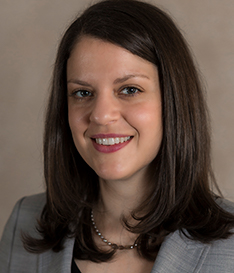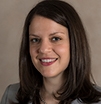PERI ECONOMIST INTERVIEW SERIES
Katherine Moos
This is part of PERI's economist interview series, hosted by C.J. Polychroniou.
Read Katherine Moo's bio here.

C.J. Polychroniou: What attracted you to economics as a college major and as a career?
Katherine Moos: Even before getting to college, I was concerned with issues of race, class, and gender. I grew up and attended public schools in Cambridge, MA, a small city which, at least when I was growing up, was very socioeconomically and racially diverse. I had been struck by the inequalities within my own community—there was enormous privilege, wealth, and prestige, and also poverty and deprivation all in about seven square miles. I had been influenced by the adults in my life who told a lot of stories about the civil rights, feminist, anti-war movements. I was also very influenced by the anti-globalization protests which were a big topic of conversation when I was in high school.
As an undergraduate, I was attracted to studying political economy and related social sciences because I was interested in social issues, especially poverty and inequality. I went to Sarah Lawrence College, and so I was lucky to be introduced to heterodox economics and political economy, rather than only learn a narrow view of economics based purely on neoclassical theory. Economics was presented as being rife with controversies and disputes, not as a single theory or way of looking at the world. Once it became clear that the policies that were impoverishing people all over the world—structural adjustment in the developing world, or welfare reform in the US—were based on ideas that could be disputed both theoretically and empirically, I was hooked.
CJP: You are researching and writing on a variety of issues, some of them from a feminist perspective. What is feminist political economy, in your view, and why do you think it is an important area of research, advocacy and teaching?
KM: Feminist political economy, like political economy more generally, is subject to various definitions. But most feminist economists would tell you that feminist political economy applies feminist theory to the study of political economic processes. This is influenced by intersectionality theory which emphasizes that women are not a homogenous group, and integrates the study of race and anti-racism, along other forms of social difference, into feminist study and practice. My approach to feminist political economy is rooted in studying the patriarchal-capitalist system as a unified social and economic system, while also maintaining and building on many insights from classical political economy. I am especially concerned with how patriarchal, capitalist, and white supremacist institutions are designed to support and structurally reinforce each other.
I think that feminist political economy is an important area of research and advocacy, because it broadens the view of the economy to include not just what happens in firms or markets, but also households, families, and other social structures. Without a feminist perspective, political economists often are not looking at the entire economy, but rather just what they recognize as economic. They often make all kinds of faulty assumptions—insisting that what happens in households is irrelevant, uninteresting, or disconnected to the economy—which I believe seriously limits the analysis.
Bringing a feminist political economy perspective to teaching economics helps students understand the economy and economic policy in a much more complete way. Bright students are sometimes turned off from economics because they feel that it doesn’t align with their own perception of reality. Many of them reject on an instinctual level neoclassical concepts like “homo economicus” otherwise known as the “rational economic man.” When they are taught these ideas, without any mention of the existing critiques, they often know that it is wrong but don’t have the language or confidence to argue with a professor. Introducing them to standard theory, as well as feminist critiques of it, broadens their understanding of the discipline, and helps them develop critical thinking. Introducing ideas and concepts like care work, gender pay gaps, labor market segmentation, and racial stratification, helps them see the value of policy interventions and envision how policy could be used to make a more equitable world.
CJP: How does your research in feminist political economy inform the policy relevant or activist work that you engage in?
KM: I would say that it goes both ways, my advocacy and political work has both informed and been informed by my research. My current research on the contradictions of the neoliberal US welfare state is very much inspired by my previous career as a policy analyst and advocate working to strengthen welfare state programs in the United States. My advocacy work which I did between undergraduate and graduate school was on the local, state, and federal level, and brought the many contradictions of the US welfare state to my attention.
While I wouldn’t have articulated it exactly this way then, what the work got me thinking about are now the central questions guiding my research agenda. My goal is to better understand why states intervene to address real or perceived crises of social reproduction, and how that relates to capitalist accumulation processes. This relies on feminist understandings of how the human capacity to work is reproduced generationally and on a day to day basis, both by purchasing commodities with earned income, as well as through unwaged caring labor in the household, and government spending for health, education, income supports, and other infrastructure.
My research in feminist political economy is very closely tied to my political work. I was the founding co-chair of the Pioneer Valley Socialist-Feminist Working Group, which has worked on various projects related to political education (in particular integrating a feminist perspective in socialist organizing) and local campaigns for reproductive justice.
CJP: The United States is long regarded as the poster child for the promotion of neoliberalism. Yet, your analysis of US redistributive policy reveals what may be regarded as a rather surprising fact, which is that workers receive more in social benefits than what they pay in taxes to Uncle Sam. How do you explain this surprising result and what are its implications?
KM: My research on the net social wage uses an accounting method that takes the total benefits that workers receive as a class and subtracts the total taxes they pay as a class. The economists who created this method, Anwar Shaikh and Ahmet Tonak, had studied the US net social wage in the 20th century. They concluded that the US welfare state was largely a “myth” as their method revealed that net of taxes, there wasn’t significant redistribution happening to labor as a class. This was an important argument at the time, especially as it related to mainstream ideas that state spending was a drag on economic growth. Their analysis called that seriously into question.
However, the updated data displays a major deviation starting around 2002. This amounted to more distribution to workers in the 21st century, which was somewhat unexpected because in my view there hadn’t been a structural break from the ideology or policy of neoliberalism. My paper, which has since been published in the Review of Radical Political Economics, explained this variation as a combination of cyclical, structural, and secular effects, including the result of increased and prolonged unemployment in the Great Recession, increased healthcare spending, an aging population, and the use of refundable and non-refundable tax credits as a favored neoliberal redistributive policy. These all played a part in an increasing net social wage.
My research implies a very different interpretation of the net social wage than existed in previous studies. I argue that a positive or increasing net social wage is not indicative of the strength of the working-class or that the state has become more benevolent, but just the opposite. I argue that we see a positive or increasing net social wage due to the increased vulnerability of workers in the 21st century.
The “myth” as I see it is not the US welfare state, but that in neoliberalism, workers are able to rely on their earned wages rather than the state. As neoliberal policy enables the stagnation of workers’ incomes and the degradation of employer-based benefits, the role of the state in maintaining the working class increases, even as cuts are made to the welfare state. The result is an even more vulnerable and disenfranchised working class, with women, people of color, children, the elderly, and people with disabilities suffering the most.
CJP: Could Coronavirus lead to a new way of thinking regarding the welfare state in the United States?
KM: I am even more convinced now of my argument that the net social wage increases as a result of the increased social and economic vulnerability of workers. While it will be a few years until the official 2020 National Income and Product Accounts (NIPA) data from the Bureau of Economic Analysis (BEA) is published, I am certain that we will see an enormous spike in the net social wage as a result of the Coronavirus. This is because as unemployment rises to historic levels, tax revenue will shrink, and state spending for automatic stabilizers, unemployment insurance, nutrition assistance, and other spending like the “stimulus checks” will all contribute to a higher net social wage. I expect this to be substantially higher than we ever observed before, even in 2010.
In order to get a timely analysis of this dynamic, I am currently working on a paper about this topic using cost projections from the Congressional Budget Office (CBO). The CBO projections can be thought of as the quantification of the state’s ex ante redistributive role, whereas the NIPA data is the effect of redistributive policy ex post. For this project I am also developing a new method, inspired by the net social wage, but more consistent with my perspective as a feminist political economist.
This new work builds on concepts in a paper I published in the Review of Social Economy, which proposes a feminist accounting framework and creates aggregate estimates of the annual cost of social reproduction in the United States. In this paper, I found that employers are paying for a decreasing share of the cost of working-class social reproduction. As both a cyclical and secular trend, the responsibility of working-class social reproduction has been shifted away from capitalists and onto households and the state. I believe that this is exactly what we are seeing now as a result of the coronavirus legislation and an effect of social distancing measures.
My goal is to better articulate how neoliberal redistributive policy is being used to maintain workers, but more than anything to preserve the current institutional arrangements which keep workers vulnerable. This provides a more nuanced understanding of the contradictory roles of the US welfare state. I hope that it will help advocates and activists fight for truly universal and emancipatory social programs and benefits.



